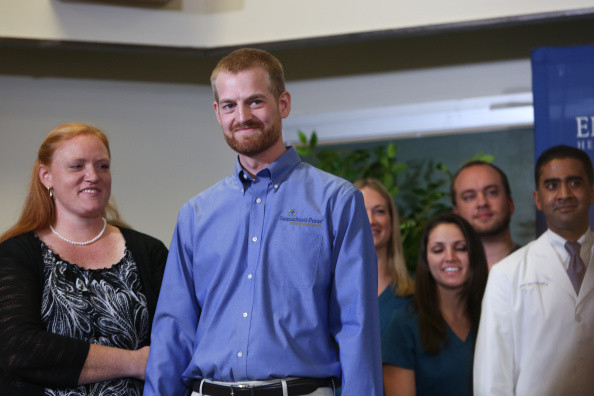Ebola Survivor Doctor Kent Brantly Donates Blood to Infected American in Nebraska

Kent Brantly, the American doctor who survived the Ebola virus has donated his blood to a fellow American doctor, Rick Sacra, who is currently being treated in Nebraska, reported NBC News.
"He flew out from North Carolina to Nebraska to give a unit of blood. His blood was a perfect match," said Franklin Graham, President and CEO of Samaritan's Purse.
We agreed that whole-blood therapies and convalescent serum may be used to treat Ebola virus disease and that all efforts must be invested into helping affected countries use them safely.
Samaritan's Purse is the humanitarian organization Brantly worked with while he was stationed in Liberia, where he contracted the Ebola virus.
After surviving from the virus, a person is immune to this strain of Ebola; hence the blood of the survivors can reportedly serve as an antidote for those who are infected with the deadly disease.
Brantly too, had received a donation of blood containing vital antibodies from another Ebola survivor, who he had treated in Libera prior to being flown to the US for the treatment.
"I felt like I was about to die. The nature of Ebola is that health-care workers are predominantly affected, because of the way that it is spread," Brantly told NBC News.
American doctor Sacra was reportedly delivering babies at a Liberian hospital when he caught the virus. Since he was not treating Ebola patients, it is unclear how he contracted the virus.
The World Health Organization approved the use of survivors' blood earlier this month.
"We agreed that whole-blood therapies and convalescent serum may be used to treat Ebola virus disease and that all efforts must be invested into helping affected countries use them safely," said Marie-Paule Kieny, Assistant Director-General of Health Systems and Innovation at the WHO.
The Ebola virus has so far infected over 3,600 people and at least 1,900 have died in Guinea, Liberia, Sierra Leone, Nigeria and Senegal, according to the World Health Organization.
© Copyright IBTimes 2025. All rights reserved.






















